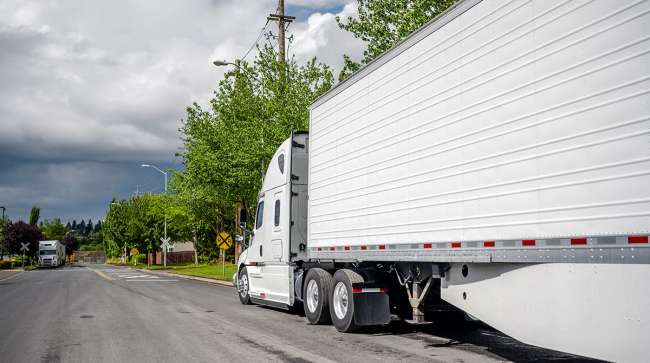Staff Reporter
Complexities in Trucking Supply Chain Cause Shippers’ Logistics to Evolve

[Stay on top of transportation news: Get TTNews in your inbox.]
Shippers are looking at developing their own truck fleets due to low service levels and greater affordability, a leading logistics report says.
The Council of Supply Chain Management Professionals released its 2022 “State of Logistics” report June 21 that was produced with consulting firm Kearney and Penske Logistics. It discussed annual comparisons of freight costs in the U.S. supply chain.
It predicted that a drop in demand and rates in the second quarter of this year “will squeeze carrier margins” while shippers “miffed” by current service levels, including driver shortages, will seek to have their own trucking fleets.
Andy Moses, senior vice president of Penske Logistics sales and solutions, compared last year with today’s current situation. “Captive fleets rose to the occasion as they became more valued, driving an accelerated adoption that remains with us today. We’ve seen shippers that have gone 10 years without a private or dedicated fleet get into them,” Moses noted.
The report revealed that motor carrier freight occupied the top U.S. supply chain category with $830.5 billion last year (23.4% higher than 2020), followed by private/dedicated transportation ($415 billion, up 39.3%), full truckloads ($332.2 billion, 10.2% higher) and less-than-truckload ($83 billion, $13.2% greater).
Penske Logistics feature on @cscmp #StateofLogistics Report, written by @kearney: Third-party logistics providers helped companies navigate #SupplyChain challenges https://t.co/IDgKwJDq6i #logistics pic.twitter.com/DLLlAsD5Qv — Penske Logistics (@PenskeLogistics) June 21, 2022
“We have seen an incredible amount of resiliency among private truck fleets and dedicated contract carriage truck fleets. Demand has been up sharply year-over-year and these fleets continue to manage the complexities they face in the trucking supply chain, including headwinds caused by shortages of parts, equipment, drivers and, most recently, rising fuel costs,” Moses remarked.
A comparison of last year’s business to 2020 found that inventory carrying costs, which included storage, insurance and handling, climbed 25.9% to $501.3 billion.
The report recommended that logistics “must be permanently about embedding resilience and agility into its capabilities before shifting its focus back to such questions as cost minimization and efficiency.”
“Carriers that had cut or delayed capacity early in the pandemic went into overdrive, spending at unprecedented levels to attract new hires and buy new trucks. Shippers worried about lost sales proved more than willing to pay ever-increasing spot rates. This sustained high demand at high prices powered profits, with top U.S. carriers seeing profits rise by 50%, 100%, or more even as their own costs of operation continued to surge,” the report stated.
Shippers have been working to build new resilience and agility despite a challenging economic environment through mergers and acquisitions, which the report called a historically popular way that trucking companies, railroads and logistics providers use to increase capacity.
While “many have sought to address the current challenges at a deeper, more intrinsic level — by evolving their delivery offerings and seeking to bring greater efficiency to capabilities that had been stood up rapidly or accelerated at the onset of the epidemic in 2020,” it noted, "relative stability may or may not return, so the logistics sector must invest now in controlling what factors it can,” including more use of technology in parcel tracking and automation.
It advised companies to commit more to “multi-shoring or friend-shoring” that requires better collaborative relationships between customers, suppliers and third-party providers as companies must coordinate more complex arrangements of transit modes and facilities.
“Stepping back for a moment, it may sound a bit odd to speak of ‘agitation’ and ‘pain’ in the context of a year [2021] in which the logistics industry grew by 22.4% to $1.85 trillion. But this was growth accompanied by chaos and high costs, and so far, 2022 seems to be offering little respite,” it concluded.
Want more news? Listen to today's daily briefing below or go here for more info:

